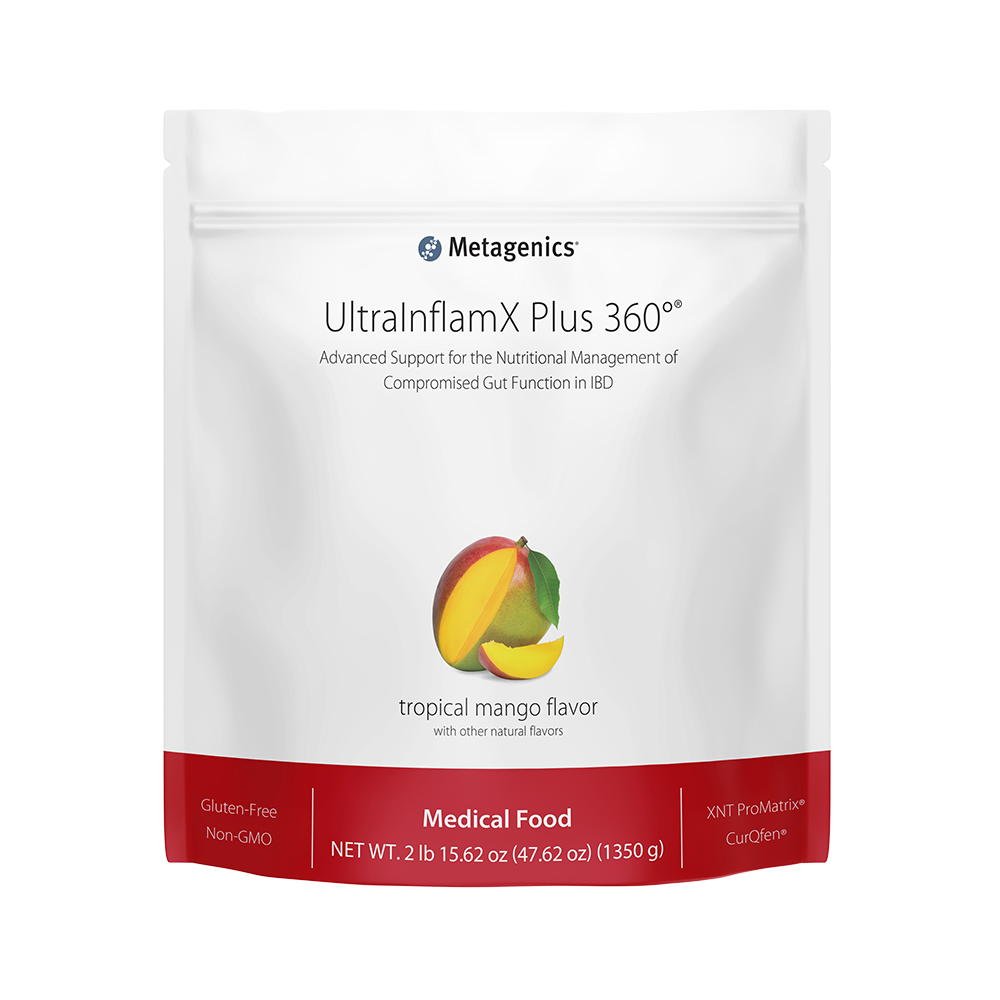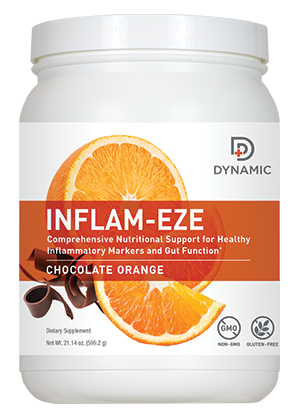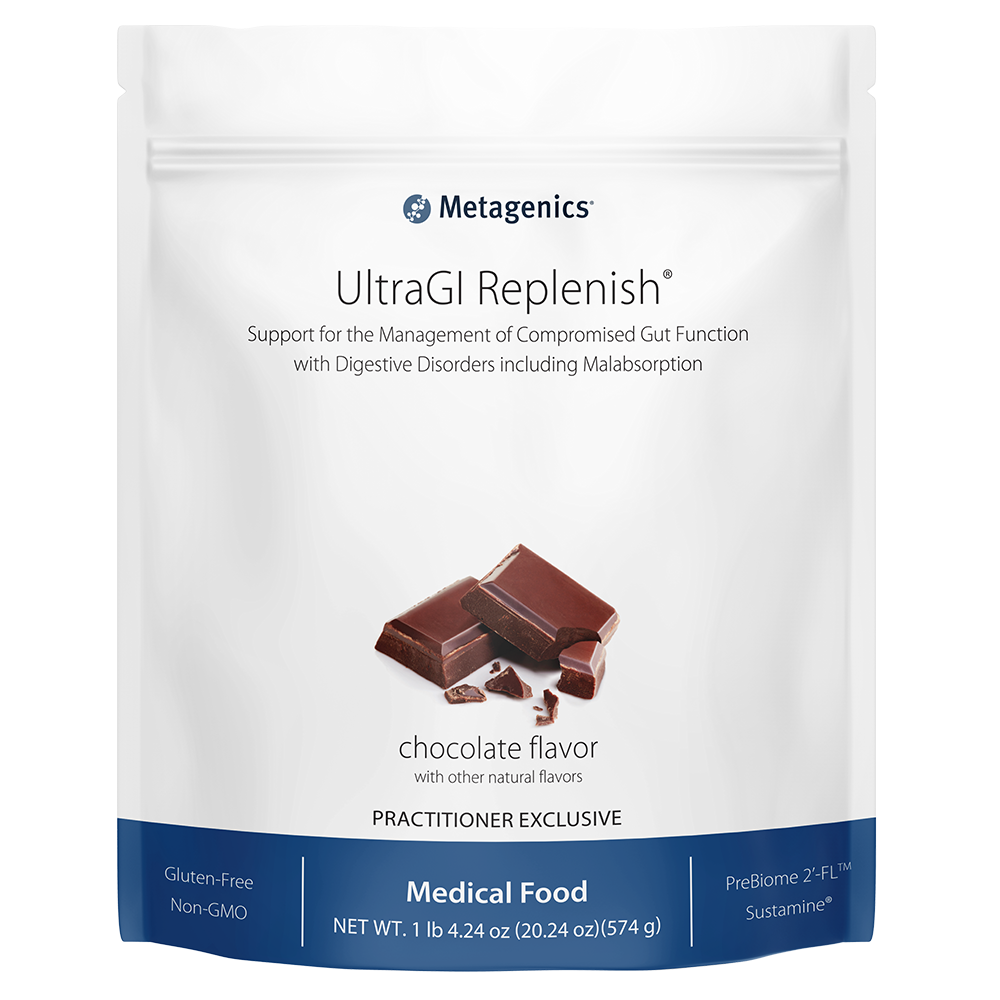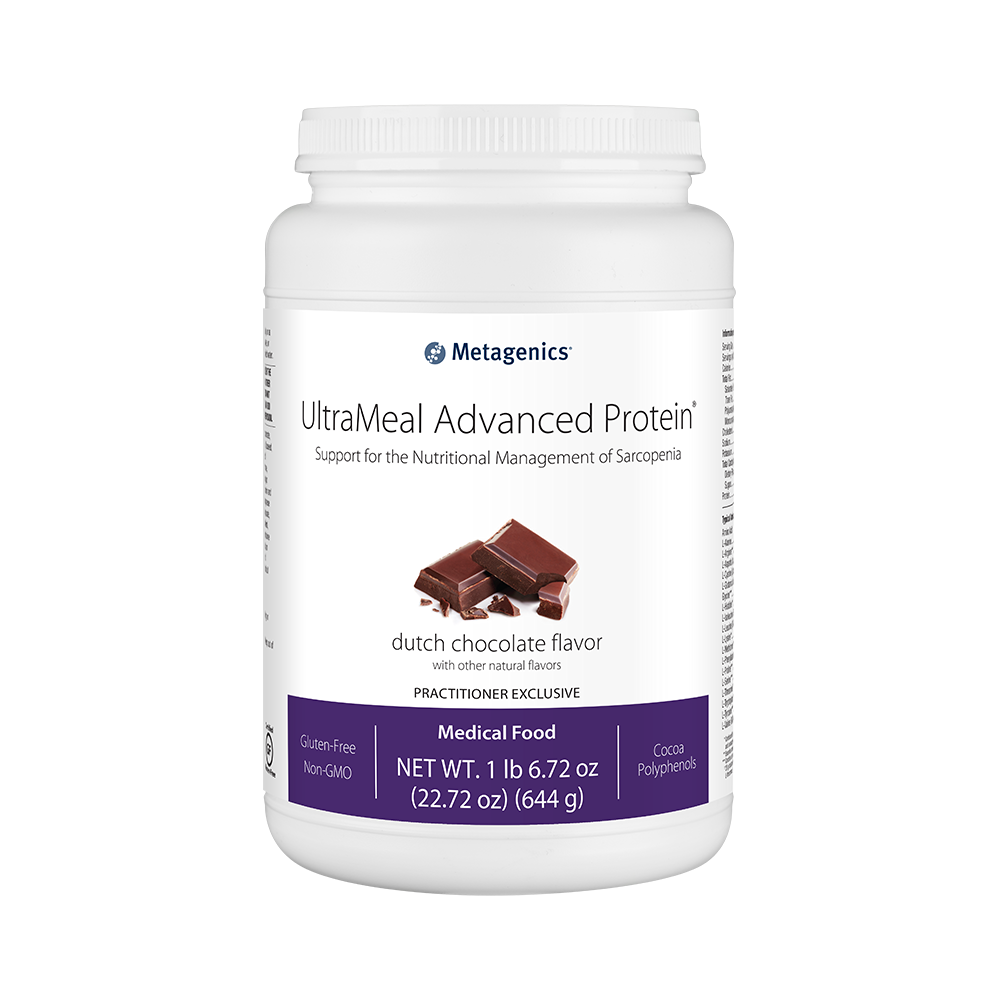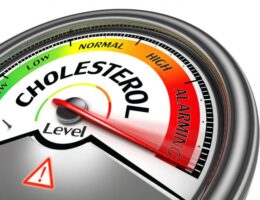Last updated on February 6th, 2023 at 01:01 pm
Supplements, Vitamins & Medical Foods Oh My! This is the complete guide to medical foods and its a big and confusing world out there. We’re diving into what exactly are medical foods, why do they exist, what are some common uses for them relating to specific conditions, and lastly what are the most popular medical foods themselves..
What Are Medical Foods?
There is a lot of confusion out there so let’s get into exactly what Medical Foods are and aren’t. Medical foods are not the apple a day keeps the doctor away or eat more vegetables kind of foods. I love apples and vegetable and I hope you do as well but medical foods are specially formulated and intended for the dietary management of a disease that has distinctive nutritional needs that cannot be met by the normal diet alone. You can’t just eat more salad and cure a disease you might have.
The FDA of course has a much longer definition which is:
“a food which is formulated to be consumed or administered enterally under the supervision of a physician and which is intended for the specific dietary management of a disease or condition for which distinctive nutritional requirements, based on recognized scientific principles, are established by medical evaluation.”
The FDA’s definition also states that medical foods are limited to products that provide crucial therapy for patients with “inborn errors of metabolism (IEM). An example of that would be a specialized baby formula for infants with phenylketonuria. Phenylketonuria (PKU) is an inborn error of metabolism that results in decreased metabolism of the amino acid phenylalanine. Untreated, PKU can lead to intellectual disability, seizures, behavioral problems, and mental disorders. It may also result in a musty smell and lighter skin.
What other kinds of conditions are we talking about you might ask? Irritable or Inflammatory Bowel Disease would be one such condition which would encompass Crohns and Ulcerative Colitis and that’s just for starters. Manufacturers are producing medical foods from powders and capsules for Alzheimer disease to low protein foods for chronic kidney disease (CKD) Other conditions like sarcopenia, and compromised gut function have also been targeted for medical foods.
Dietary Supplements on the other hand by definition provide nutritional support for people that are considered healthy meaning they don’t have an identified disease that requires nutritional support, but may need additional calcium as they age or they may have a dietary deficiency they are trying to make up for.
Why Do They Exist & History
Medical foods are meant to reduce the impacts or symptoms of a specific disease or condition when the patient cannot manage the condition through diet modification and therefore requires nutritional supplementation.
The use of medical foods is thought to have started in the 1940’s when convalescing elderly patients were given formulas of lipids, carbohydrate and whey protein. The first commercially developed medical food was developed in the late 1960’s and was called Lofenalac. It was a formula for infants developed by Mead Johnson to treat the inborn error of metabolism phenylketonuria (PKU).2
The Orphan Drug Act of 1983 was the first-time medical foods were officially defined. It stated Medical Foods were specially formulated mixtures of nutrients and phytochemicals to be used under physician supervision. Although medical foods don’t need to be registered or approved by the FDA the FDA has provided some oversight over the years. The FDA’s medical foods page has further information on their guidance around medical foods.
The global market for medical foods is approximately $18 billion in 2019 and continued growth is expected. Europe for the most part has a much larger market as medical foods are more accepted as a whole across the medical and patient communities. It’s still very much a niche market in the United States.
One of the reasons it continues to be a niche is the policing of medical foods hasn’t been a priority for the FDA. That in turn has led to a proliferation of products that don’t meet the FDA’s narrow definition of medical foods even though many of the products would meet a common sense definition for medical foods. This has caused great confusion amongst manufacturers, consumers, physicians and even the regulators themselves. The White House issued an executive order in 2019 that prohibits federal agencies from issuing guidance in lieu of rules which should mean that if medical foods are re-visited by the FDA that the definition would broaden and more foods that are already being used as “medical foods” would be accepted as such under a broader regulatory definition. Here are some examples of products marketed as medical foods.
| Table 2. Examples of Products Marketed as Medical Foods | |||
|---|---|---|---|
| Product/Manufacturer | Formulation | Condition It Claims to Treat | Cost |
| Axona | Powder | Alzheimer disease | $84 – $111 per month |
| Flavis (Dr Schär) | Low-protein foods (eg, spaghetti) | CKD | $5.49 for pack of spaghetti |
| FosteumPlus (Primus) | Capsules | Osteopenia/osteoporosis | $29 – $49 per month |
| KetoCal (Danone) | Powder or liquid | Intractable epilepsy | $5 drink box; $30 for 300-g can of formula |
| Theramine | Capsules | Pain (inflammatory conditions) | $60 per month |
Medical Food Uses:
- Diabetic Neuropathy
- Nutritional Deficiency
- ADHD
- Alzheimer’s Disease
- Depression
- Irritable Bowel Syndrome (IBS)
For IBS you may also consider a low FODMAP diet as part of a support regimen to relieve symptoms and promote microbiome healing. - Leaky Gut
There are some common digestive diseases as well as diseases found in other parts of the body that are often associated with leaky gut. These include conditions like Celiac Disease, Crohn’s Disease, and irritable bowel syndrome (IBS), or inflammatory bowel disease (IBD), as well as diabetes and liver disease. Many of these are considered autoimmune diseases or contain an autoimmune component. Autoimmune responses have been shown to be made worse by the presence of harmful substances that enter the bloodstream from the intestines. When these substances cross the intestinal barrier, the body recognizes them as foreign or harmful objects to be attacked through an immune response. (Crohn’s Disease and Ulcerative Colitis are the most common types of Inflammatory Bowel disease. The difference between the two is party based on location. Cronh’s can involve any location on the GI tract starting at the mouth and going to the perianal area. Ulcerative Colitis usually involves either the colon or the rectum.
- Compromised Gut Function
If you experience abnormal absorption of nutrients in your intestines that would be an example of compromised gut function. This could be caused by a lack of nutrient absorption further up in your body and may be related to medical conditions like celiac disease, crohn’s disease and ulcerative colitis or short bowel syndrome. The lack of nutrient absorption in this category can also be linked to bacterial overgrowth in the intestinal tract.
- Sarcopenia
It literally means “lack of flesh” and it’s a condition of age-based muscle degeneration that becomes more common in people over 50. Some causes of Sarcopenia are aging related while others are preventable with a healthy diet and regular exercise. For those that may not be able to exercise due to injury or are experiencing rapid muscle loss a medical food recommended by their doctor may be an option to reduce the effects. The main ingredients that can help with Sarcopenia are protein, vitamin D, Omega-3 fatty acids and creatine. Learn more about Sarcopenia and how medical foods may help.
- Dyslipidemia
It used to be the top three but now it’s the top four with the addition of medical food’s for Dyslipidemia. Dyslipidemia is a big word that simply means there is elevated total cholesterol or low-density lipoprotein (LDL) which is the bad type of cholesterol. High density lipoprotein (HDL) cholesterol levels (this is the good kind) can be low, and the concentrations of other lipids and apolipoproteins can also be abnormal.1-4 Dyslipidemia contributes to the development of atherosclerosis which is a hardening of the arteries and is an important risk factor for coronary heart disease (CHD) and stroke. It can also cause peripheral artery disease which reduces blood flow usually in the legs causing damage and potentially stroke. There are many more factors and scenarios so you’ll want to explore Dyslipidemia further.
Popular Medical Foods
So what are some of the most popular medical foods out there? From what we see in the marketplace and hear from customers, the company Metagenics has most of the most popular medical foods for the conditions we’ve focused on in this guide. Although there is a wide range of supplements for GI-related conditions when it comes to the actual “medical food” aspect this is where Metagenics excels. Nutridyn is also a recent entrant into the Medical Foods space. Please note that none of these products should be taken without the express consent of your doctor and should be used in partnership with your doctor for your specific medical plan and conditions.
UltraInflamX Plus 360 by Metagenics
In support of Inflammatory Bowel Disease and Compromised Gut Function, UltraInflamX utilizes a proprietary vegan pea/rice protein matrix technology with added amino acids (including 50% essential amino acids, including branched-chain amino acids) and L-glutamine to support lean tissue and intestinal mucosal cells. It features Isomalto-oligosaccharides (IMO), a prebiotic that encourages the production of short-chain fatty acids (SCFAs), which promote intestinal mucosal health and a healthy intestinal environment. The fat profile includes flaxseed oil, a source of alpha-linolenic acid (an omega-3 fatty acid), and medium-chain triglycerides, a rapidly absorbed lipid source. UltraInflamX includes 20+ vitamins and minerals, including key micronutrient forms designed for enhanced bioavailability (folate, B12, D3) to help address increased nutrient needs and 6 grams of fiber per serving. It comes in the following flavors and package sizes.
30 Serving Pouch: Tropical Mango | Pineapple Banana
14 Serving Pouch: Tropical Mango | Pineapple Banana | Chocolate Orange | Original Spice | Orange
Physicians Elemental Diet
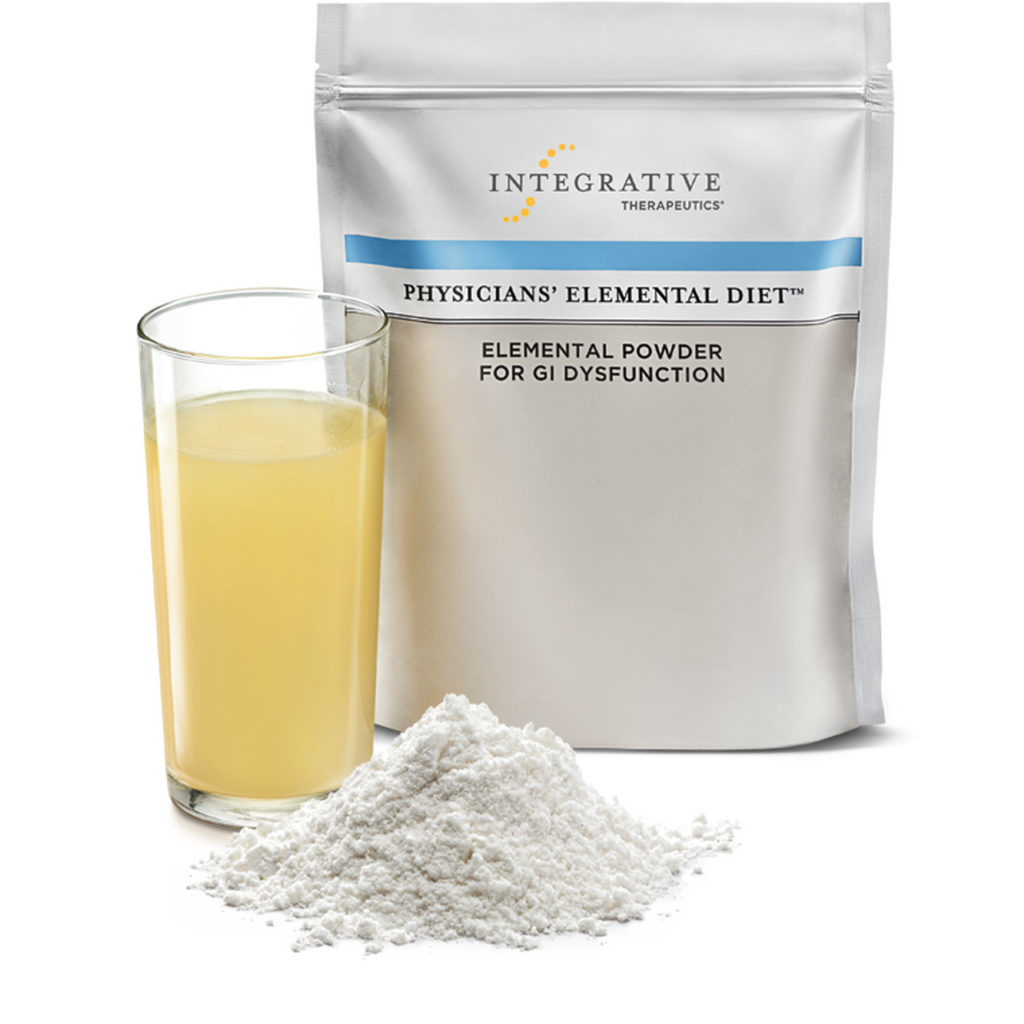
Integrative Therapeutics Physicians Elemental Diet contains a balanced blend of macronutrients fortified with essential micronutrients and electrolytes. It was designed to provide comprehensive support as the sole source of nutritional intake for limited time periods. All the ingredients are in their simplest form for easy digestion and the product was designed to taste good which is an added bonus. This hypoallergenic formula contains no intact proteins, polypeptides, corn, gluten, soy, or dairy. It comes in a sugar-free version called the Physicians Elemental Diet Dextrose Free.
Physicians Elemental Diet | Physicians Elemental Diet Dextrose Free
Dynamic Inflam-Eze by Nutridyn
In support of Inflammatory Bowel Disease and Compromised Gut Function, Dynamic Inflam-Eze utilizes a vegan rice protein matrix technology with added amino acids including branched-chain amino acids) and L-glutamine to support lean tissue and intestinal mucosal cells. Dynamic Inflam-Eze is a comprehensive nutritional supplement for individuals looking to support overall well-being and healthy inflammatory markers with potent ingredients such as turmeric. It is a plant-based protein powder full of vitamins, minerals, antioxidants, amino acids, BCAAs, and a balanced ratio of protein, carbohydrates, and fats for optimal support of macro-and micronutrients based on clinical research.
UPDATES (11/10/2020): The pea protein was removed and replaced with a rice protein for easier digestibility. The can sugar was removed and replaced with all-natural Xylitol as a healthier sweetener option. 500mg of lysine per serving was added which is clinically shown to promote a healthy stress response.
It comes in the following flavors and package sizes.
30 Serving Pouch: Chocolate Orange | Spiced Chai | Rainbow Punch
14 Serving Pouch: Chocolate Orange | Spiced Chai | Rainbow Punch
Capsules: 90 Capsules | 180 Capsules
UltraGI Replenish by Metagenics
UltraGI Replenish is a medical food formulated to provide specialized macro and micro-nutrient support for patients with compromised gut function with digestive disorders including malabsorption. UltraGI is specifically formulated to address gastrointestinal (GI) issues such as Irritable Bowel Syndrome (IBD), Leaky Gut, Crohns, and has scientifically proven nutrients.
Ultragi Replenish is specially designed for maximum absorption utilizing a proprietary formula called Sustamine. Sustamine is an advanced form of L-Glutamine that is highly absorbable and in studies it shows a 224% increase in absorption compared to standard L-Glutamine. L-Glutamine is a fuel source for your mucosal cells and this critical amino acid works hard to improve those intestinal mucosal cells so they can work properly. Many of the symptoms of Leaky Gut are resolved once these cells have healed and can perform their basic functions so absorption into those cells is key to ensuring they are functioning optimally. https://tinyurl.com/ultragi
30 Serving Pouch: Chocolate | Vanilla
14 Serving Pouch: Chocolate | Vanilla
UltraMeal Advanced Protein by Metagenics
UltraMeal Advanced Protein is a medical food specially formulated to support the nutritional management of sarcopenia. This advanced formula features essential amino acids, including added leucine, to support the healthy aging of skeletal muscle and to help address sarcopenia, the age-associated loss of skeletal muscle mass.
Each serving provides 20 g of protein from a proprietary blend of pea and rice and amino acids. 10 g (of the total protein) consists of essential amino acids including 5 g of BCAA, which, combined with exercise, may help support muscle maintenance.
Cocoa polyphenols support processes that contribute to healthy blood flow and vascular function. Additionally, UltraMeal Advanced Protein contains 20+ essential vitamins and minerals—including calcium L-5-methyltetrahydrofolate (L-5-MTHF, body-ready folate), methylcobalamin (vitamin B12)—to support protein synthesis and healthy metabolic function, and 4 grams of prebiotic isomalto-oligosaccharides.
14 Serving Container: Dutch Chocolate | French Vanilla | Plain
Insurance Coverage
There is a general lack of insurance coverage along with a significant amount of confusion relating to medical foods which frustrate parents, advocates, physicians, and manufacturers. These combined groups are advocating for the Medical Nutrition Equity Act which would mandate public and private payer coverage of medical foods for IEM’s and digestive conditions such as IBD and or Crohn’s disease. Primus Pharmaceuticals has launched its own campaign, Cover My Medical Foods, to enlist consumers and others to the cause.
NOTHING IN THIS WEBSITE IS INTENDED AS, OR SHOULD BE CONSTRUED AS, MEDICAL ADVICE. ANY HEALTHCARE AND/OR NUTRITIONAL MATERIAL CONTAINED IN THIS WEBSITE IS FOR CONSUMER INFORMATIONAL AND EDUCATIONAL PURPOSES ONLY. SUCH MATERIAL IS NOT INTENDED AS MEDICAL ADVICE FOR CONDITIONS OR TREATMENT, NOR IS IT INTENDED AS A SUBSTITUTE FOR A MEDICAL EXAMINATION BY A HEALTHCARE PROFESSIONAL. CONSUMERS SHOULD CONSULT THEIR OWN HEALTH CARE PROFESSIONALS FOR INDIVIDUAL MEDICAL RECOMMENDATIONS.
- Magnesium Threonate: An Honest Buying Guide for Health Enthusiasts - March 21, 2024
- Magnesium Citrate Vs Glycinate: 5 Key Differences And Benefits - March 14, 2024
- How to Pick the Best Magnesium Glycinate Supplement for You - March 7, 2024

